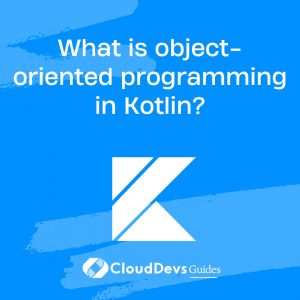What is object-oriented programming in Kotlin?
Object-oriented programming (OOP) is a programming paradigm that emphasizes the concept of objects, encapsulation, inheritance, and polymorphism to model real-world entities and behaviors in software systems.
In Kotlin, like in many other programming languages, object-oriented programming is a fundamental approach to structuring and organizing code. Kotlin provides comprehensive support for object-oriented programming principles, making it suitable for developing large-scale, maintainable, and extensible applications.
Key concepts of object-oriented programming in Kotlin include:
- Classes and Objects: Classes are blueprints for creating objects, which are instances of classes. Classes encapsulate data and behavior related to a specific entity or concept. Objects represent individual instances of a class and interact with each other through method invocations and property access.
- Encapsulation: Encapsulation is the principle of bundling data and methods that operate on the data within a single unit, i.e., a class. It hides the internal state of an object and exposes a well-defined interface for interacting with the object. This promotes modularity, code reuse, and maintainability.
- Inheritance: Inheritance allows a class (subclass) to inherit properties and methods from another class (superclass). Subclasses can extend the functionality of their superclass and specialize behavior as needed. Kotlin supports single-class inheritance, meaning a class can inherit from only one superclass.
- Polymorphism: Polymorphism enables objects to be treated as instances of their superclass, allowing for flexibility and extensibility in code. Kotlin supports polymorphism through method overriding and interface implementation.
- Abstraction: Abstraction is the process of hiding complex implementation details and exposing only the essential features of an object. Abstract classes and interfaces in Kotlin facilitate abstraction by defining contracts that classes must adhere to without specifying implementation details.
Object-oriented programming in Kotlin promotes code organization, reusability, and scalability by providing mechanisms for modeling complex relationships, managing state, and expressing behavior in a structured and modular manner. It enables developers to design robust and maintainable software solutions that can evolve over time to meet changing requirements and business needs.








